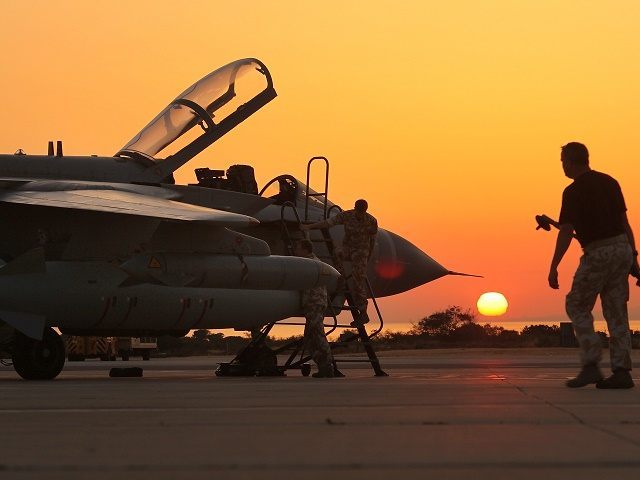Britain’s Royal Air Force has launched another series of strikes against the Islamic State over the past week, but the infrequent contribution to the coalition of nations bombing ISIS calls into question both the political will and ability to continue.
The RAF reports an air patrol last Thursday gave close air support to a group of Kurdish peshmerga troops who had become bogged down by an ISIS sniper team inside a building, dropping a Paveway IV bomb on the location and flattening the structure with the terrorist inside. The two Tornado GR4 aircraft then used a Brimstone anti-tank missile to take out an armoured truck in support of the Iraqi Army who were engaged near Ar Rutbah.
Excluding the enormous cost of deploying, maintaining and operating two RAF Tornado GR4 aircraft in Iraq, the cost of the operation will have cost £160,000 in munitions alone, as the RAF uses advanced GPS guided bombs and munitions to take out extremely low-tech targets. Breitbart London estimates the cost of bombs hit £1 million in just the first week of the operation when it commenced last September.
Although soft-skinned targets such as simple stone buildings, pick-up trucks and captured Humvees could easily be taken out by unsophisticated laser guided bombs of the previous generation, all RAF aircraft were updated to carry only the latest equipment in anticipation of facing sophisticated enemy targets instead of primitive insurgents.
Many of Britain’s older, but perfectly servicable aircraft capable of easily taking out ground targets cost-effectively have been scrapped to save money for coming, over budget American-built fifth generation aircraft like the F-35 Lightning II programme. Britain’s vaunted Harrier fleet was scrapped in the wake of the 2010 Strategic Defence Spending Review (SDSR), and the 1970’s vintage Tornado aircraft now kept in service to bomb the Islamic State are under threat of being scrapped, with no replacement in sight.
The British government is in the process of writing the next SDSR, a process expected to see keep cuts in certain areas of UK military capability, leading one senior Naval admiral to plead with the government not to turn the report into a “cuts exercise”. Admiral Sir Nigel Essenhigh, former First Sea Lord has already said the present state of the British armed forces has left the nation “feeble”, and unable to defend its own interests.

COMMENTS
Please let us know if you're having issues with commenting.